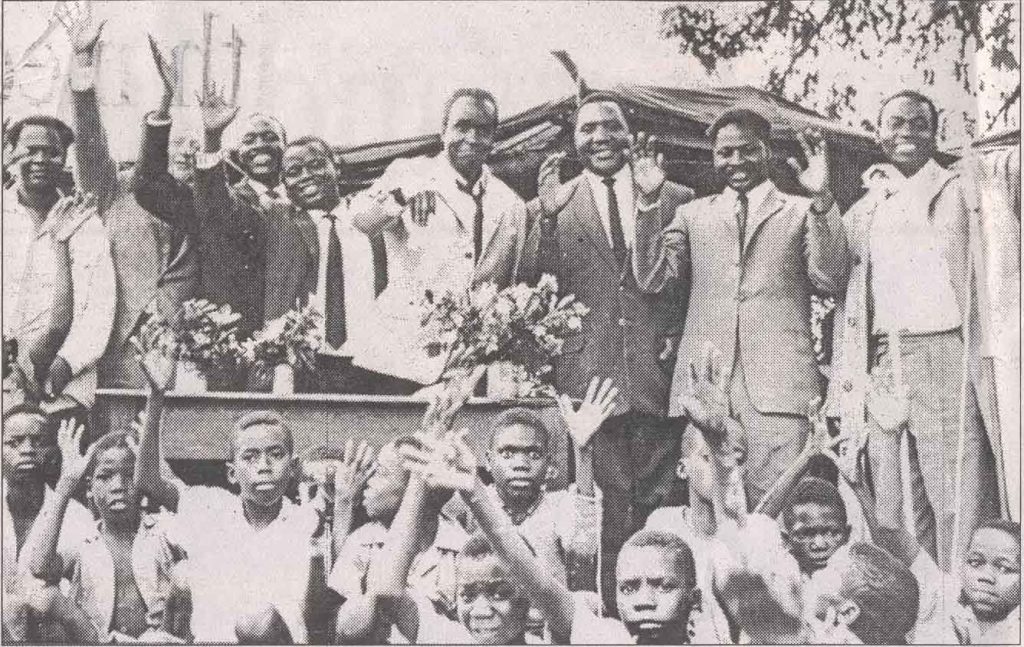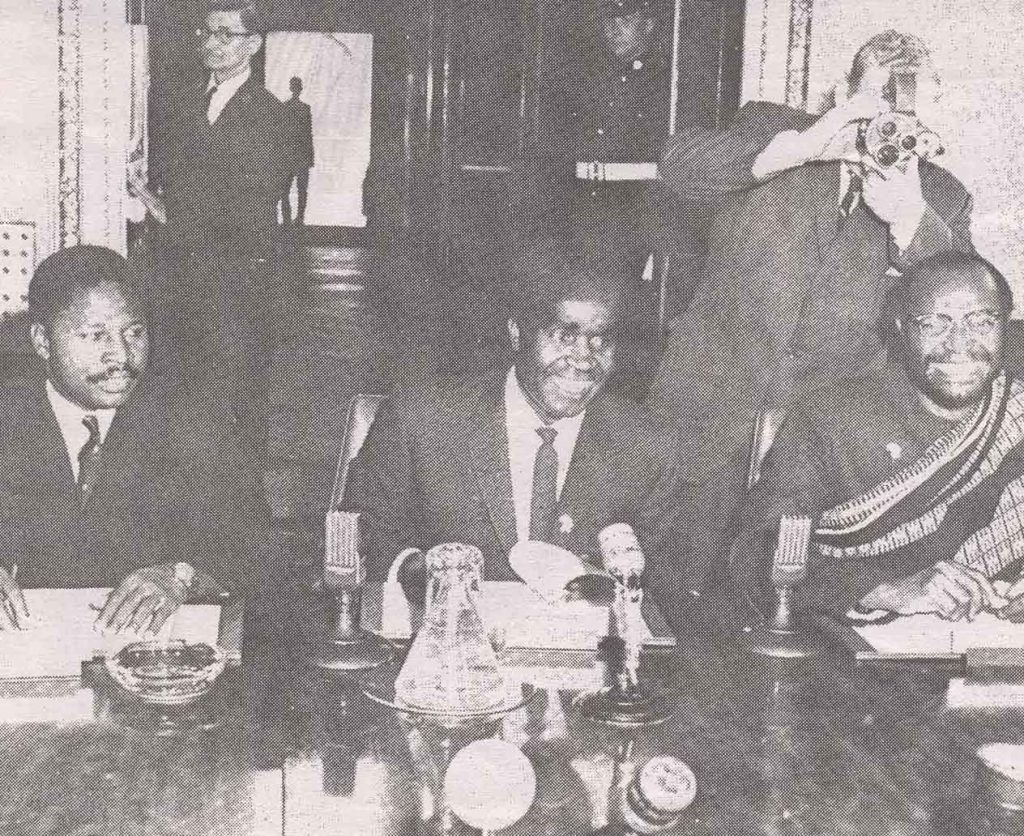Mathias Mainza Chona, one of Zambia’s key freedom fighters and veteran politician in the history of Zambia was born on 21 January 1930. Son of a Tonga Chief, Mainza Chona worked hard and graduated with a Barrister-at-law degree at London’s Gray’s Inn.
His active political career began at a time of great political turmoil in 1959 when the Zambia Africa National Congress (ZANC) party led by Kenneth David Kaunda was banned in March 1959. Chona had remained neutral without holding any party card although he was more sympathetic to ZANC. However, after ZANC’s ban, he bought his party card of the Africa National Congress (ANC) led by Harry Mwaanga Nkumbula.

|
The ANC’s political stamina dwindled as it experienced internal dissension and therefore lacked the political clout to confront and pressurize the Federal Government more aggressively regarding Zambia’s independence. Not long after joining, Chona led a breakaway faction from ANC. To ensure a strong united anti-imperialist movement, Chona negotiated with the African National Independence Party (ANIP), a party that had been created after the ban of ZANC; the two parties merged to form the United National Independence Party (UNIP). Chona was elected President of the Party. Chona was calculating and knew how to steal the hearts of the people as he ventured to many dangerous opposition territories. He sold UNIP policies and emphasised on national unity. UNIP quickly gained momentum and emerged as a symbol of unity. After Kenneth Kaunda was released from prison in January 1960, Chona gracefully handed over the presidency of UNIP to him; a man he felt was best suited for the job. Chona became Deputy President. At the first UNIP Mulungushi General Conference in 1961 “Chona was appointed National Secretary, a position he held for over eight years while concurrently holding different ministerial positions. In November 1961, Chona was charged with sedition by the High Court of Northern Rhodesia. He was charged with publishing a seditious publication describing the evils of colonial rule. He was convicted of the offense. However, at the time the sentence against him was passed, Chona was in Tunis attending the Second All African People’s Congress a Pan African organization. He took refuge in England where he remained for over a year. During that time Chona represented UNIP and campaigned for funds and against colonialism. He also served as a UNIP delegate to the Federal Review Conference. He returned home after charges against him were dropped.
|

Chona served in diverse ministerial positions. He was the first Minister of Justice in January 1964 up until Zambia’s independence when he was appointed Minister of Home Affairs in October 1964 (1964 Cabinet of Zambia).
In 1966 to 1967 he became the Minister of Presidential Affairs thereafter Minister without Portfolio. In December 1968 he was appointed Minister of Central Province for three months, a post he felt was not meant for him. He was again re-appointed Minister without Portfolio a second time.
After the UNIP Central Committee – which was elected at the controversial 1967 Mulungushi UNIP General Conference – was dissolved in August 1969, Chona became Minister of the Interim Executive Committee and also Minister of Provincial and Local Government.
In December 1969, Chona was appointed Ambassador to the United States of America. Less than a year later he was recalled and appointed Vice-President of Zambia.
While serving as Vice President in 1972, Kaunda assigned Chona as Chairman of the National Commission on the establishment of a One Party Participatory Democracy, also know as the Chona Commission. The Commission’s terms of reference were to recommend the structure of the One Party State.
Zambia’s second Republic was born under the One Party Participatory Democracy in December 1972. The post of Vice-President was abolished and the posts of Secretary-General of the Party and Prime Minister were created.
Chona became the first Prime Minister of Zambia, he resigned in 1975 and Elijah Mudenda was appointed to that position. Chona became the Minister of Legal Affairs and Attorney General until 1977 when he was again re-appointed Prime Minister a second time. Not long after, he was appointed Secretary-General of the Party until 17 February 1981 when he was succeeded by Humphrey Mulemba and Chona was appointed Ambassador to the People’s Republic of China, it is not clear what led to this demotion as Chona was always a key player in national politics.
Unable to take up the post of Ambassador for personal reasons, during this time he was a member of the UN Interaction Council of former Heads of States and Governments; Chona opened a law firm. He later accepted the posting to China in 1984 where he remained for a period of five years. He served as Ambassador to China accredited to Vietnam and North Korea. Chona was later transferred as Ambassador to France accredited to Spain and Algeria from 1989 to early 1992 when the Movement of Multiparty Democracy (MMD) won the presidential and parliamentary elections in 1991. Chona was recalled to Zambia where he continued as a staunch UNIP member until his demise.
With his rich political background and leadership, President Frederick Chiluba named him as one of Zambia’s State Counsellors.
Below is a list of positions that Mainza Chona Held in chronological order from 1959 to 2001.
|
POLITICAL PARTY POSITIONS
|
GOVERNMENT POSITIONS
|
|
|
President of United National Independence Party (UNIP) |
|
|
|
Deputy President of UNIP |
||
|
National Secretary of UNIP |
||
|
Minister of Justice
|
||
|
Minister of Home Affairs
|
||
|
Minister of Presidential Affairs
|
||
|
Minister without Portfolio
|
||
|
Minister of Central Province
|
||
|
Minister without Portfolio
|
||
|
UNIP Member of Central Committee |
Ambassador to The United States of America
|
|
|
Vice President of the Republic of Zambia
|
||
|
Prime Minister
|
||
|
Minister of Legal Affairs and Attorney General
|
||
|
Prime Minister
|
||
|
Secretary General of the Party UNIP
|
|
|
|
UNIP Party Cadre |
Ambassador to the Peoples Republic of China
|
|
|
Ambassador to France
|
||
|
UNIP Member of Central Committee
|
|